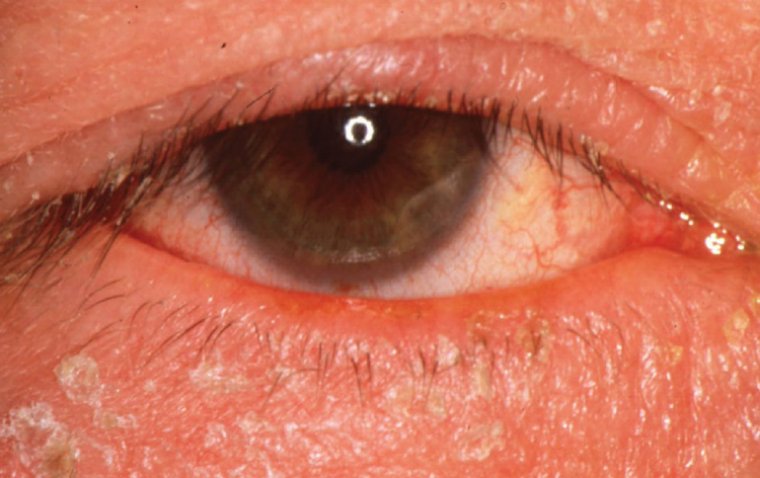Imagine waking up with itchy, red, and crusty eyelids. You try to wash it away, but it feels like it’s just getting worse. Your eyes are dry, sensitive to light, and even your vision seems a little blurry. The culprit: blepharitis. You may be wondering if this frustrating and often uncomfortable condition can spread to others.

Image: ophthalmologybreakingnews.com
Blepharitis is a common inflammation of the eyelids that affects the tiny oil glands at the base of your eyelashes. While it can be incredibly bothersome, understanding its nature and the potential for transmission is crucial. This article will delve into the world of blepharitis, exploring its causes, symptoms, and whether it’s contagious. We’ll unpack the truth about transmission, empowering you with knowledge about blepharitis and how to manage this inflammatory condition.
Unpacking Blepharitis: A Closer Look
Blepharitis is broadly categorized into two main types: anterior and posterior blepharitis. Anterior blepharitis happens when the tiny hair follicles at the base of your eyelashes become inflamed, due to bacteria, mites, or even dandruff. Posterior blepharitis occurs when the oil glands at the base of your eyelashes don’t produce enough oil or produce an abnormal oil. This can lead to an oily, crusty build-up that further irritates the eyelids.
Symptoms of Blepharitis:
The symptoms of blepharitis can vary, but common signs include:
- Red, itchy, and swollen eyelids
- Flaky, crusty build-up on the eyelashes
- Dry, irritated eyes
- Sensitivity to light
- Blurred vision
- Grainy feeling in the eyes
- Burning sensation
While these symptoms can be incredibly uncomfortable, it’s important to remember that blepharitis is not usually a serious health concern. However, it can be persistent, and it’s important to seek the advice of an eye doctor or ophthalmologist for proper diagnosis and treatment.
Is Blepharitis Contagious? Demystifying the Transmission
The biggest question for those experiencing blepharitis is whether it’s contagious. The answer, thankfully, is largely no. Blepharitis is not typically contagious like a cold or flu. It’s not spread through direct contact with an infected person or through sharing personal items.
When It Can Be Contagious:
While blepharitis itself isn’t contagious, there are a few exceptions:
- Bacterial infection: In some cases, blepharitis can be caused by a specific bacteria like Staphylococcus aureus. While rare, the bacteria itself could be contagious, if someone touches an infected eyelid and then touches another person’s eye.
- Demodex mites: These tiny mites live in the hair follicles of your eyelashes and contribute to a specific type of blepharitis. While they are not actively contagious like other parasites, they can be passed through direct contact with infected eyelashes, but this is very uncommon.
Key Takeaway: Blepharitis is generally not contagious. The instances where it can be contagious are limited to specific bacterial or parasitic infections, and even then, it’s rarely transferred through casual contact.
Managing Blepharitis: Taking Control of Your Eyelid Health
Managing blepharitis effectively requires a two-pronged approach: addressing the symptoms and reducing the underlying causes.
Simple Home Remedies:
- Warm compresses: Apply a warm compress to your eyelids for 5-10 minutes multiple times daily. This helps to loosen up the crusty build-up and increase oil flow.
- Gentle eyelid scrubs: Use a clean washcloth and mild baby shampoo to gently massage your eyelids and remove the crusts.
- Eye drops: Lubricating eye drops can help alleviate dryness and irritation.
- Avoid eye makeup: Reduce the irritation by avoiding eye makeup, especially mascara, until the condition improves.
Medical Intervention:
- Antibiotics: If bacterial infection is suspected, your doctor may prescribe antibiotic eye drops or ointments.
- Anti-inflammatory medications: For severe inflammation, your doctor may prescribe oral anti-inflammatory medications.
- Anti-mite shampoo: In cases of Demodex mite infection, your doctor may recommend using a specialized anti-mite shampoo on your eyelashes.
Long-Term Lifestyle Changes:
- Hygiene: Wash your hands frequently, and avoid touching your eyes unless they are clean.
- Diet: A healthy diet rich in omega-3 fatty acids can help support healthy oil production.
- Environmental triggers: Be mindful of environmental triggers like dust, pollen, and smoke, and take steps to minimize exposure.
Seeking Professional Guidance:
While these tips can help manage blepharitis symptoms, remember that seeking professional advice from your doctor or ophthalmologist is crucial for accurate diagnosis and effective treatment. They can determine the underlying cause of your blepharitis and recommend the most appropriate treatment plan for your specific situation.
Image: drbishop.com
Blepharitis & Its Impact: Beyond the Symptoms
Blepharitis, while not typically a serious health concern, can have a significant impact on your quality of life. The constant redness, itchiness, and dryness can be incredibly frustrating and interfere with daily activities. It can disrupt sleep, making you feel exhausted and impacting your mood.
Even more challenging, blepharitis can lead to other eye problems like:
- Eye infections: Uncontrolled blepharitis can increase the risk of developing eye infections like conjunctivitis (pink eye).
- Vision changes: Severe blepharitis can potentially affect your vision, especially if the oil glands become blocked, interfering with tear production.
- Dry eye: Untreated posterior blepharitis can contribute to dry eye syndrome.
For these reasons, it’s essential to seek professional help if you’re experiencing persistent symptoms of blepharitis. Early intervention can significantly reduce the chances of complications and help you regain comfort and clear vision.
Is Blepharitis Contagious
Conclusion: Empowering You with Knowledge about Blepharitis
While blepharitis can be bothersome, it’s generally not contagious. Knowing this can help ease concerns about spreading the condition. However, remember that early diagnosis, prompt treatment, and maintaining good eye hygiene are essential for effective management.
If you experience blepharitis symptoms, don’t hesitate to consult your doctor or ophthalmologist. They can help you determine the underlying cause of your condition and recommend a treatment plan tailored to your needs. With the right approach, you can manage blepharitis effectively and reclaim your comfortable vision.






